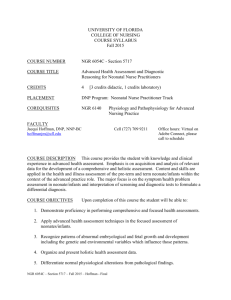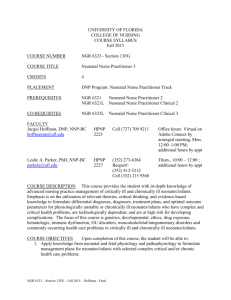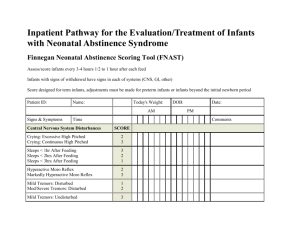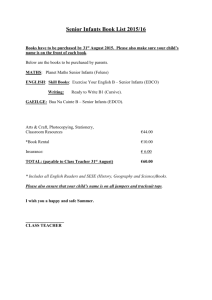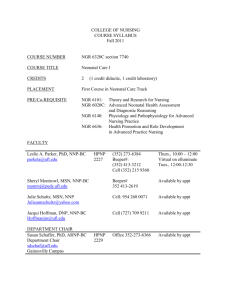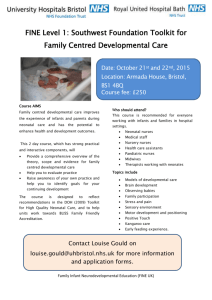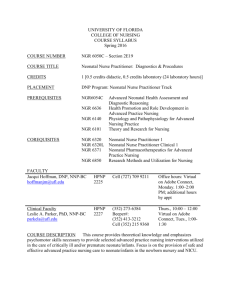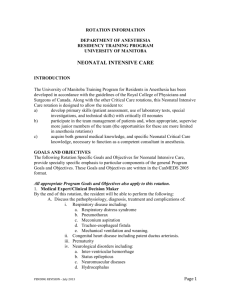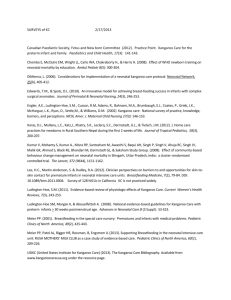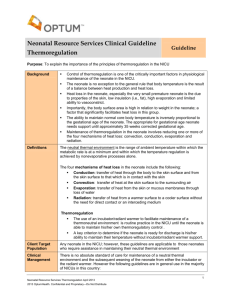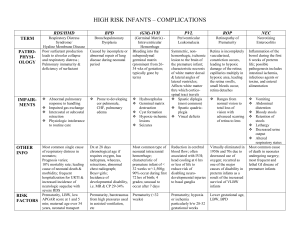7101 - College of Nursing
advertisement
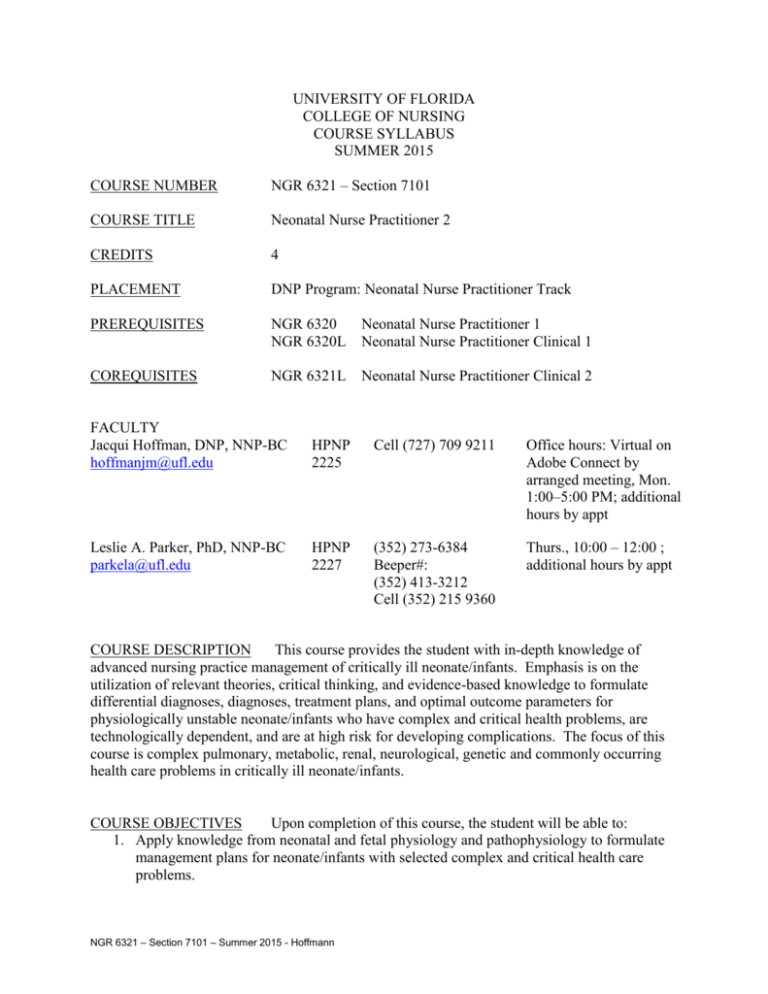
UNIVERSITY OF FLORIDA COLLEGE OF NURSING COURSE SYLLABUS SUMMER 2015 COURSE NUMBER NGR 6321 – Section 7101 COURSE TITLE Neonatal Nurse Practitioner 2 CREDITS 4 PLACEMENT DNP Program: Neonatal Nurse Practitioner Track PREREQUISITES NGR 6320 NGR 6320L Neonatal Nurse Practitioner 1 Neonatal Nurse Practitioner Clinical 1 COREQUISITES NGR 6321L Neonatal Nurse Practitioner Clinical 2 FACULTY Jacqui Hoffman, DNP, NNP-BC hoffmanjm@ufl.edu HPNP 2225 Cell (727) 709 9211 Office hours: Virtual on Adobe Connect by arranged meeting, Mon. 1:00–5:00 PM; additional hours by appt Leslie A. Parker, PhD, NNP-BC parkela@ufl.edu HPNP 2227 (352) 273-6384 Beeper#: (352) 413-3212 Cell (352) 215 9360 Thurs., 10:00 – 12:00 ; additional hours by appt COURSE DESCRIPTION This course provides the student with in-depth knowledge of advanced nursing practice management of critically ill neonate/infants. Emphasis is on the utilization of relevant theories, critical thinking, and evidence-based knowledge to formulate differential diagnoses, diagnoses, treatment plans, and optimal outcome parameters for physiologically unstable neonate/infants who have complex and critical health problems, are technologically dependent, and are at high risk for developing complications. The focus of this course is complex pulmonary, metabolic, renal, neurological, genetic and commonly occurring health care problems in critically ill neonate/infants. COURSE OBJECTIVES Upon completion of this course, the student will be able to: 1. Apply knowledge from neonatal and fetal physiology and pathophysiology to formulate management plans for neonate/infants with selected complex and critical health care problems. NGR 6321 – Section 7101 – Summer 2015 - Hoffmann COURSE OBJECTIVES (continued) 2. Develop appropriate differential diagnoses and diagnoses based on analysis and interpretation of hypothetical data including history, presenting symptoms, physical findings, and diagnostic information for high risk and critically ill neonate/infants. 3. Prioritize acute and chronic problems and provide appropriate interventions including emergency care. 4. Formulate treatment plans based on current scientific rationale, evidence-based and practice guidelines and standards of care for high risk and critically ill neonate/infants. 5. Propose parameters to evaluate the effectiveness of management plans in achieving optimal outcomes for high risk and critically ill neonate/infants. 6. Discuss collaborative processes of the interdisciplinary health care team in achieving optimal health outcomes for high risk and critically ill infants. 7. Analyze diversity issues related to high risk and critically ill neonate/infants. COURSE SCHEDULE Day Class On-line Time Classes will be on Mondays from 9 AM - 1 PM on Adobe Connect unless otherwise announced. On Neo I exam dates, class will be Monday from 11:30 AM - 1 PM. Neo II Exams 9-11AM Mandatory onsite class date to be announced. E-Learning in Canvas is the course management system that you will use for this course. ELearning in Canvas is accessed by using your Gatorlink account name and password at https://lss.at.ufl.edu/. There are several tutorials and student help links on the E-Learning login site. If you have technical questions call the UF Computer Help Desk at 352-392-HELP or send email to helpdesk@ufl.edu. It is important that you regularly check your Gatorlink account email for College and University wide information and the course E-Learning site for announcements and notifications. Course websites are generally made available on the Friday before the first day of classes. TOPICAL OUTLINE 1. Health maintenance and anticipatory care of the late preterm infant. NGR 6321 – Section 7101 – Summer 2015 - Hoffmann TOPICAL OUTLINE (continued) 2. Embryology, pathology and advanced nursing management of diseases and congenital defects related to the respiratory, gastrointestinal, cardiac, neurologic and metabolic systems. 3. Pathophysiology, assessment and management of neonates/infants requiring ECMO. 4. Management of emergency care in the NICU and delivery room 5. Collaborative processes of the interdisciplinary health care team in achieving optimal health outcomes for high risk and critically ill infants. 6. Diversity issues related to high risk and critically ill neonate/infants. TEACHING METHODS Lecture, group discussion, case studies and case presentations, audiovisual materials, and computer assisted instruction. LEARNING ACTIVITIES Online and class participation and written assignments. EVALUATION METHODS/COURSE GRADE CALCULATION 4 Case studies 30% total - 7.5% each Case Study 1: June 1st Case Study 2: June 22nd Case Study 3: July 13th Case Study 4: August 3rd Criteria for case studies will be in course materials at the beginning of term. 3 Examinations 60% total - 20% each Neo II Exam 1: June 1st Neo II Exam 2: July 6th Neo III Exam 3: August 3rd Class Participation 10% All students are required to place at least 4 entries per week on the Sakai discussion board. This may include submitting new items for discussion or to discuss an issue already introduced. Discussions should be submitted weekly; points will not be awarded for discussions submitted all at one time. Total 100% All graded assignments will be graded and returned to the student within 2 weeks of submission unless otherwise notified. NGR 6321 – Section 7101 – Summer 2015 - Hoffmann MAKE UP POLICY Make-up exams will only be arranged in the event of extreme emergencies and the course faculty must be notified in advance. Students who have extraordinary circumstances preventing submitting any assignment by the due date should explain these circumstances to the course instructor prior to the scheduled assignment due date. Failure to discuss prior to the due date will result in the missed assignment not being accepted once the assignment has been reviewed in class. If the case study assignment has not been reviewed in class, a letter grade will be lost for each additional day the assignment is late, if the student did give prior notification to the course faculty. Attendance at seminars are required; if unable to attend due to illness or emergency, the course faculty must be notified in advance, and the student will be required to listen to the recorded session and submit a summary of each presentation highlighting areas that increased their understanding of the problem/disease process. GRADING SCALE/QUALITY POINTS A 95-100 (4.0) C 74-79* (2.0) A93-94 (3.67) C72-73 (1.67) B+ 91- 92 (3.33) D+ 70-71 (1.33) B 84-90 (3.0) D 64-69 (1.0) B82-83 (2.67) D62-63 (0.67) C+ 80-81 (2.33) E 61 or below (0.0) * 74 is the minimal passing grade For more information on grades and grading policies, please refer to University’s grading policies: https://catalog.ufl.edu/ugrad/current/regulations/info/grades.aspx REQUIRED TEXTBOOKS Blackburn, S. (2013). Maternal, fetal, and neonatal physiology: A clinical perspective. (4th ed.). Elsevier. ISBN: 9781437716238. Cloherty, J., Eichenwald, E., Hansen, A. & Stark, A. (2012). Manual of Neonatal Care, (7th ed.). Lippincott, Williams & Wilkins. ISBN-13: 978-1-60831-777-6. (suggested to purchase with workbook at CCPR: http://ccprwebsite.org/cp_product.cfm?i=102) Gomella, T. L., Cunningham, M.D., & Eyal, F.G. (2013). Neonatology management, procedures, on-call problems, diseases and drugs: 25th Anniversary (7th ed.). McGraw-Hill Professional Publishing. ISBN: 9780071768016. Moore, K. & Persaud, T. (2011). The Developing Human: Clinically oriented embryology (9th ed.). Elsevier. ISBN - 9781437720020. Young, T. E., & Mangum, B. (Most recent edition – available online). Neofax. RECOMMENDED TEXTBOOK Donn, S. M. & Sinha, S. K. (2012). Manual of Neonatal Respiratory Care (3rd ed.). Springer. ISBN: 9781461421542. WEEKLY CLASS SCHEDULE Will be announced at beginning of the term on course website. NGR 6321 – Section 7101 – Summer 2015 - Hoffmann UNIVERSITY AND COLLEGE OF NURSING POLICIES: Please see the College of Nursing website for a full explanation of each of the following policies - http://nursing.ufl.edu/students/student-policies-and-handbooks/course-policies/. Attendance Academic Honesty UF Grading Policy Accommodations due to Disability Religious Holidays Counseling and Mental Health Services Student Handbook Faculty Evaluations Student Use of Social Media NGR 6321 – Section 7101 – Summer 2015 - Hoffmann
